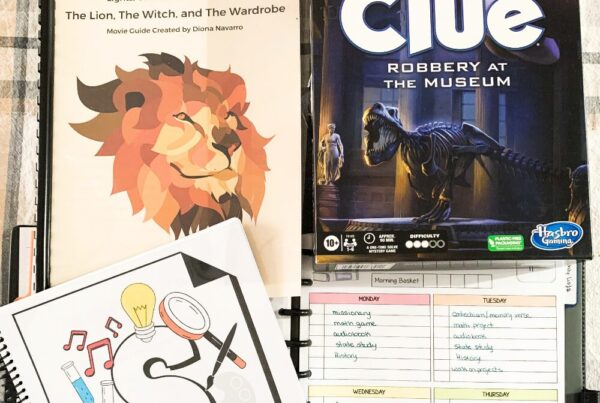I love that homeschooling provides a unique opportunity to tailor our children’s education to their individual needs and learning style. One of my goals is to empower my children to become independent learners, capable of taking charge of their education. Cultivating independent learning skills not only prepares them for academic success but also equips them with essentials life skills. In this blog post, we’ll explore six strategies to encourage independent learning in your home and/or homeschool.

This blog post is about how to encourage independent learning in your homeschool.
6 Independent Learning Strategies
1. Create a Learning-Friendly Environment
Setting up a conducive learning environment is the first step towards promoting independent learning. Designate a organized space or spaces where your child can study and explore free from distractions. This can be a dining room table, their bedroom, living room floor, or a separate room. Ensure that the necessary learning materials, such as books, notebooks, and art supplies, are readily available. By providing a dedicated learning area, you signal the importance of focused study, helping your child transition into a productive learning mindset.
2. Set Clear Expectations and Goals
Clearly define learning expectations and goals for each subject or topic. When your child understands what is expected of them, they can better plan their study sessions. Collaboratively set achievable short-term and long-term goals, fostering a sense of ownership over their education. Regularly revisit these goals to track progress and celebrate achievements, reinforcing the value of self-directed learning.
3. Encourage Curiosity and Exploration
Foster a love for learning by encouraging your child’s natural curiosity. Present a wide range of subjects and resources, allowing them to explore topics of interest beyond the traditional curriculum. Incorporate hands-on activities, experiments, field trips, and educational games to make learning engaging and interactive. When children are passionate about what they’re learning, they’re more likely to take the initiative to explore further on their own.
This blog post is about encouraging independent learning in your homeschool.

4. Develop Time Management Skills
Teaching time management is another important aspect of nurturing independent learners. Help your child create a flexible schedule that outlines when they will work on each subject or project. Include breaks and leisure time to prevent burnout. As they adhere to their schedule, they’ll learn to allocate time efficiently, prioritize tasks, and avoid procrastination. Over time, these skills will serve them well not only in their education but also in various aspects of life.
5. Promote Critical Thinking and Problem-Solving
Independent learning is closely tied to critical thinking and problem-solving abilities. Encourage your child to think critically by posing open-ended questions, discussing different perspectives, and challenging them to find solutions to real-world problems. Incorporate activities that require analysis, synthesis, and evaluation of information. This approach nurtures their ability to think independently, make informed decisions, and apply knowledge creatively.
6. Encourage Self-Assessment and Reflection
Promote self-assessment by encouraging your child to reflect on their learning journey. After completing assignments or projects, ask them to evaluate their work and identify areas for improvement. Encourage them to seek constructive feedback from you, peers, or online resources. This practice cultivates critical thinking skills and a proactive approach to learning. Discussing their strengths and areas of growth helps them develop a deeper understanding of their learning style and preferences.
Are you encouraging independent learning in your homeschool? If so, let us know how in the comments.



